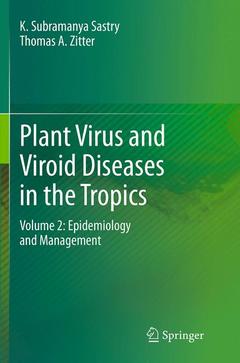Description
Plant Virus and Viroid Diseases in the Tropics, 2014
Volume 2: Epidemiology and Management
Authors: Sastry K. Subramanya, A. Zitter Thomas
Language: English
Subject for Plant Virus and Viroid Diseases in the Tropics:
Approximative price 210.99 €
In Print (Delivery period: 15 days).
Add to cartPublication date: 08-2016
Support: Print on demand
Approximative price 210.99 €
In Print (Delivery period: 15 days).
Add to cartPublication date: 01-2014
489 p. · 15.5x23.5 cm · Hardback
Description
/li>Contents
/li>Comment
/li>
Chapter I - Ecology and Epidemiology of Virus and Viroid Diseases of Tropical Crops
1.1 Introduction
1.2 Epidemiological concepts
1.3 Conditions favorable for epiphytotics
1.4 Cropping systems and practices
1.5 Host properties
1.6 Pathogen properties
1.7 ICTV recognized viruses
1.8 Pathways of virus spread
1.9 Dispersal and Migration of Insect vectors
1.10 Factors of Vector transmission
1.11 Virus Survival and spread
1.12 Disease forecasting
1.13 The cyclical nature of plant disease
1.14 Disease progress curve
1.15 Growth models for disease progress
1.16 Spatial dynamics and metapopulations
1.17 Disease gradients and progress curves
1.18 Mathematical modeling techniques
1.19 Virus-vector population model
1.20 Systems Analysis and Simulation Models
1.21 Conclusions
Chapter II - Management of Virus and Viroid Diseases of Crops in the Tropics
2.1 Introduction
2.2 Need for diagnosis of plant virus and viroid diseases
2.3 Approaches for virus and viroid diseases management
2.4 Use of virus / viroid-free vegetative propagules and true seed
2.5 Certification schemes of crops having virus transmission through true seed
2.6 Virus and viroid disease transmission through Vegetative propagules
2.7 Success stories of production of virus-free plant propagules
2.8 Certification schemes of economically important crops
2.9 Production and use of virus-free transplants
2.10 Need for managing the virus diseases
2.11 Avoidance of sources of infection / inoculums
2.12 Variation of the crop cultural practices
2.13 Cross-protection in crop plants
2.14 Vector control
2.15 Role of botanicals in plant virus management
2.16 Role of oils in arthropod vector control
2.17 Biological control of plant virus vectors
2.18 Avoidance of vectors
2.19 Role of repelling and attracting surfaces in vector control
2.20 Resistance
2.21 Transgenic approach
2.22 Bio-safety regulations against GM Crops
2.23 Induction of systemic resistance
2.24 Quarantines
2.25 Pest risk analysis (PRA)
2.26 World Trade Organization regime and its implications
2.27 Plant biosecurity
2.28 Role of IPGRI and NBPGR in germplasm maintenance and exchange
2.29 Role of FAO / IBPGR in germplasm exchange
2.30 Methods of testing at quarantine stations
2.31 Important cases of introduction
2.32 Important diseases restricted to some countries
2.33 Effective methods of plant importations
2.34 General principles for the overall effectiveness of quarantines
2.35 Need for networking for the developing countries
2.36 Integrated approach
2.37 Challenges for the future
In tropical countries virus and virus-like diseases cause enormous yield losses and hence demands effective management measures
Understanding the plant virus epidemiology is vital to formulating viable disease management practice in a given agro-ecosystem
Approaches for effective management of virus diseases viz., production of virus free plant materials and certification schemes, vector control through chemical and non-chemical methods, resistance breeding and transgenic plants
Includes supplementary material: sn.pub/extras
These books may interest you

Seed-borne plant virus diseases 158.24 €

Seed-borne plant virus diseases 158.24 €


